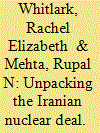| Srl | Item |
| 1 |
ID:
157350


|
|
|
|
|
| Summary/Abstract |
How does the acquisition of latent nuclear capabilities—in the form of enrichment and reprocessing facilities—affect a state’s military security and bargaining power? On the one hand, nuclear latency might serve as a “virtual deterrent” against would-be aggressors, as well as a bargaining chip in international negotiations. On the other hand, some research holds that states cannot deter military challenges without at least a deliverable nuclear device. Other scholarship suggests that a state’s pursuit of latency invites nonproliferation sanctions and preventive strikes. We address this debate by quantitatively investigating the conditions when latency benefits or burdens states in their international interactions. To do so, we analyze a dataset of latency measures and a variety of military and bargaining outcomes. The results suggest that latency invites coercion without producing deterrence. Our findings imply that post–Joint Comprehensive Plan of Action (JCPOA), latency is more likely to undermine Iran’s economic and military well-being than it is to benefit its prosperity or security. That, in turn, suggests that the JCPOA will not increase Iran’s deterrent capability or its international influence, a fact that should temper fears about the negative consequences of the agreement.
|
|
|
|
|
|
|
|
|
|
|
|
|
|
|
|
| 2 |
ID:
165275


|
|
|
| 3 |
ID:
155055


|
|
|
|
|
| Summary/Abstract |
Why do some leaders use preventive military force to destroy another country's nuclear program, while others do not? Despite nuclear proliferation becoming a growing source of concern, counter-proliferation decision making remains poorly understood. Additionally, though the preventive logic pervades the scholarship as one potential state response to relative decline, it remains unclear when this leads to war and when it does not, especially in the nuclear context. This article demonstrates that the decision to consider and use preventive force rests not only on material factors but more importantly on a leader's prior beliefs about nuclear proliferation and the threat posed by a specific adversary. Conducting original archival research and process tracing, this manuscript examines American decision making against the Communist Chinese nuclear program, and demonstrates that Presidents John F. Kennedy and Lyndon B. Johnson held fundamentally different nuclear beliefs that led to radically different preventive war preferences.
|
|
|
|
|
|
|
|
|
|
|
|
|
|
|
|
| 4 |
ID:
150969


|
|
|
|
|
| Summary/Abstract |
On July 14, 2015, the Islamic Republic of Iran and the international community, led by the United States and the European Union, signed the Joint Comprehensive Plan of Action (JCPOA) ensuring for the next 10–15 years that Iran's nuclear program was entirely peaceful. In the subsequent months, the International Atomic Energy Agency (IAEA) verified that all signatories to the agreement had fulfilled their obligations. The deal allows Iran to retain a substantial portion of its nuclear infrastructure—specifically its ability to indigenously enrich uranium into fissile material, the material required in nuclear weapons.
|
|
|
|
|
|
|
|
|
|
|
|
|
|
|
|